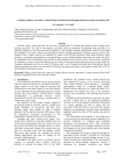JavaScript is disabled for your browser. Some features of this site may not work without it.
| dc.contributor.author | Celik, Onur | |
| dc.contributor.author | Sánchez, Joan-Pau | |
| dc.date.accessioned | 2017-08-14T17:49:08Z | |
| dc.date.available | 2017-08-14T17:49:08Z | |
| dc.date.issued | 2017-09-29 | |
| dc.identifier.citation | Sanchez JP, Celik O, Landing in binary asteroids: A global map of feasible descend opportunities for unpowered spacecraft, Proceedings of 68th International Astronautical Congress, 25 - 29 September 2017, Adelaide, Australia | en_UK |
| dc.identifier.uri | https://dspace.lib.cranfield.ac.uk/handle/1826/12311 | |
| dc.description.abstract | Asteroid surface science provides the necessary “ground-truth” to validate and enhance remote sensing from orbiting spacecraft. Yet, due to uncertainties associated with the dynamical environment near asteroids, it is generally prudent for the main spacecraft to remain at a safe distance. Instead, small landers could be used much more daringly. This paper explores the potential for ballistic landing opportunities in binary asteroid systems. The dynamics near a binary asteroid are modelled by means of the Circular Restricted Three Body Problem, which provides a reasonable representation of a standard binary system. Natural landing trajectories are sought that allow for deployment from safe distances and touchdown with minimum local-vertical velocity. The necessary coefficient of restitution to ensure a successful landing and the effects of navigation and deployment errors are also analysed. Assuming deployment errors in the order of 10 meters and 1 cm/s (1-sigma), the results show that ballistic descent landing operations are likely to be successful if targeting near equatorial regions with longitude within 320o to 20o in the secondary of the binary system. | en_UK |
| dc.language.iso | en | en_UK |
| dc.publisher | International Astronautics Federation | en_UK |
| dc.rights | ©2017 The Authors. This is the final published version of the article (version of record). Attribution 4.0 International (CC BY 4.0) You are free to: Share — copy and redistribute the material in any medium or format Adapt — remix, transform, and build upon the material for any purpose, even commercially. The licensor cannot revoke these freedoms as long as you follow the license terms. Under the following terms: Attribution — You must give appropriate credit, provide a link to the license, and indicate if changes were made. You may do so in any reasonable manner, but not in any way that suggests the licensor endorses you or your use. Information: No additional restrictions — You may not apply legal terms or technological measures that legally restrict others from doing anything the license permits. | |
| dc.subject | Binary asteroid missions | en_UK |
| dc.subject | Trajectory design | en_UK |
| dc.subject | Ballistic descent trajectories | en_UK |
| dc.subject | Circular restricted three body problem | en_UK |
| dc.subject | Deployment errors | en_UK |
| dc.subject | Covariance matrix | en_UK |
| dc.title | Landing in binary asteroids: A global map of feasible descend opportunities for unpowered spacecraft | en_UK |
| dc.type | Conference paper | en_UK |
Files in this item
This item appears in the following Collection(s)
-
Staff publications (SATM) [4364]
